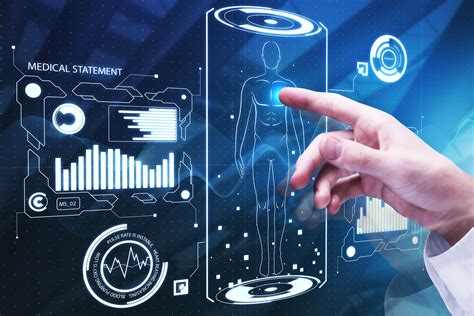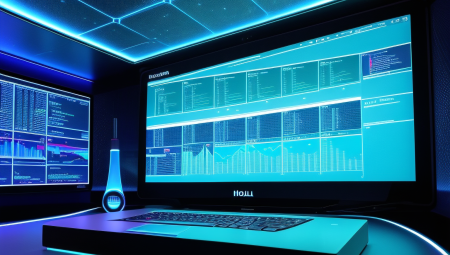In today’s fast-paced and technology-driven world, there is no denying that the integration of health and technology has revolutionized the way we manage and monitor our well-being. From wearable devices that offer real-time health monitoring to telemedicine that provides easy access to healthcare, the advancements in health tech have truly redefined the healthcare industry.
The emergence of artificial intelligence in healthcare has paved the way for personalized treatment solutions, while digital health platforms have simplified the way we manage our health. Moreover, the Internet of Things (IoT) has connected patients and healthcare providers like never before, and virtual reality has transformed the way rehabilitation is approached. Genomic medicine has unlocked the power of personalized medicine, while robotics in surgery has advanced precision and efficiency.
Health apps have empowered individuals to take control of their health, and blockchain technology has enhanced the security and privacy of health data. In this blog post, we will explore the various health tech innovations that are shaping the future of healthcare and how they are positively impacting the way we manage our well-being.
Table of Contents
Wearable Devices: Enhancing Health Monitoring
Wearable Devices are revolutionizing the way we monitor our health. These devices, often in the form of smartwatches or fitness trackers, offer real-time data on our physical activity, heart rate, sleep patterns, and even stress levels. With the advancement in sensor technology, these devices are becoming more accurate and reliable, providing individuals with valuable insights into their overall health.
By continuously monitoring key health metrics, wearable devices empower users to make informed decisions about their lifestyle and well-being. Whether it’s tracking the number of steps taken in a day or monitoring heart rate during exercise, these devices promote a proactive approach to health management.
Moreover, wearable devices are not only beneficial for individuals but also for healthcare professionals. The data collected by these devices can be shared with medical practitioners, allowing for remote monitoring and proactive intervention. This integration of technology into healthcare is enhancing the efficiency and effectiveness of health monitoring and disease management.
In conclusion, wearable devices are playing a pivotal role in enhancing health monitoring. Their ability to provide real-time data, promote proactive health management, and facilitate remote monitoring is transforming the way we approach healthcare. As technology continues to evolve, wearable devices will continue to offer new and innovative ways to improve our overall well-being.
Telemedicine: Revolutionizing Healthcare Access
In today’s fast-paced world, access to healthcare has become a significant challenge for many people. Fortunately, telemedicine is revolutionizing the way individuals can receive medical care, regardless of their location. This innovative approach uses digital communication technologies to connect patients with healthcare providers, enabling remote diagnosis, treatment, and monitoring.
One of the key benefits of telemedicine is its ability to improve healthcare access for individuals in rural or underserved areas. Patients who would otherwise have to travel long distances to see a specialist can now access the care they need from the comfort of their own homes. This not only saves time and money for the patient but also reduces the burden on healthcare facilities.
Moreover, telemedicine has the potential to enhance patient outcomes by enabling more frequent and convenient access to healthcare services. Patients with chronic conditions can benefit from remote monitoring and real-time communication with their healthcare providers, leading to better management of their health and potential earlier intervention when needed.
As technology continues to advance, the possibilities for telemedicine are expanding, with the potential to transform the way healthcare is delivered on a global scale. By breaking down geographical barriers and leveraging the power of digital health platforms, telemedicine is opening up new opportunities for improving healthcare access and outcomes for individuals worldwide.
Artificial Intelligence in Healthcare: Personalized Treatment Solutions
Artificial Intelligence (AI) has drastically transformed the healthcare industry, providing personalized treatment solutions for patients. AI algorithms are capable of analyzing vast amounts of patient data, including medical records, diagnostic images, and genetic information, to identify patterns and make predictions for individualized treatment plans.
By leveraging AI, healthcare providers can deliver targeted therapies, medication dosages, and surgical procedures tailored to the specific needs of each patient. This precision medicine approach not only improves treatment effectiveness but also minimizes the risk of adverse reactions and side effects.
Furthermore, AI-enabled healthcare tools such as chatbots and virtual health assistants empower patients to actively participate in their own care journey. These digital companions can offer personalized health recommendations, remind patients of medication schedules, and provide support for managing chronic conditions, ultimately enhancing patient engagement and adherence to treatment regimens.
With the continuous advancements in AI technology, the future of healthcare is unfolding with unprecedented opportunities for delivering personalized, precise, and effective treatment solutions that meet the unique requirements of every patient.
Digital Health Platforms: Simplifying Health Management
Digital health platforms are revolutionizing the way individuals manage their health and wellness. These platforms encompass a wide range of technologies and tools that allow users to track their health data, access medical resources, and communicate with healthcare providers in a convenient and efficient manner. From mobile apps to online portals, digital health platforms are simplifying health management for people of all ages and backgrounds.
One of the key benefits of digital health platforms is their ability to centralize health information and provide users with a comprehensive view of their well-being. Through these platforms, individuals can easily monitor their fitness activities, track their nutrition, and manage chronic conditions with personalized tools and resources. This level of accessibility and convenience empowers individuals to take control of their health and make informed decisions about their care.
Furthermore, digital health platforms facilitate seamless communication between patients and healthcare professionals. Users can securely message their providers, schedule appointments, and access telemedicine services for virtual consultations. This streamlined approach to healthcare delivery not only saves time and resources, but also improves access to care for individuals living in remote or underserved areas.
Overall, digital health platforms play a vital role in simplifying health management for individuals and promoting proactive and preventive approaches to wellness. As these technologies continue to evolve, they have the potential to transform the healthcare landscape and improve health outcomes for people around the world.
IoT in Healthcare: Connecting Patients and Providers
In today’s digital age, IoT, or the Internet of Things, has revolutionized the way we approach healthcare. By connecting devices and sensors through the internet, IoT has the potential to greatly improve patient care and streamline healthcare processes.
IoT in healthcare allows for seamless communication between patients and healthcare providers. This technology enables remote monitoring of patients’ vital signs, medication adherence, and overall wellness, providing healthcare professionals with real-time data to make informed decisions.
Furthermore, IoT devices such as wearable fitness trackers and smart medical devices help patients take control of their own health. These devices can track physical activity, sleep patterns, and more, allowing individuals to make proactive choices for their well-being.
By integrating IoT into healthcare, patients and providers are more connected than ever before, leading to improved efficiency, better outcomes, and ultimately, a higher quality of care.
Virtual Reality in Therapy: Transforming Rehabilitation
Virtual reality (VR) technology has taken the world by storm, and its applications extend far beyond gaming and entertainment. In the field of healthcare, VR has emerged as a powerful tool for transforming rehabilitation and therapy. By creating immersive, simulated environments, VR therapy is revolutionizing the way patients recover from injuries and surgeries.
One of the key advantages of VR in therapy is its ability to engage patients in their rehabilitation exercises. Traditional therapy exercises can be repetitive and mundane, leading to lack of motivation and adherence. However, VR therapy provides an interactive and engaging experience, making the rehabilitation process more enjoyable for patients.
Furthermore, VR therapy allows for personalized rehabilitation programs tailored to the specific needs of each patient. By simulating real-world scenarios, patients can practice activities of daily living in a safe and controlled environment. This not only accelerates the rehabilitation process, but also boosts the patient’s confidence in performing everyday tasks.
In addition, VR therapy has shown promising results in treating chronic pain and neurological disorders. By immersing patients in calming and distracting virtual environments, VR therapy can help alleviate pain and reduce the perception of discomfort. Moreover, VR-based cognitive rehabilitation has been effective in improving cognitive functions and memory in patients with neurological conditions.
Genomic Medicine: Unlocking the Power of Personalized Medicine
Genomic medicine is a rapidly advancing field that is revolutionizing the way we approach healthcare. By analyzing a person’s genetic makeup, healthcare providers are able to tailor medical treatment and care to the specific needs of each individual. This personalized approach has the potential to greatly improve patient outcomes and overall health.
One of the key benefits of genomic medicine is the ability to identify genetic predispositions to certain diseases. By understanding an individual’s genetic risk factors, healthcare providers can develop proactive strategies to prevent illness and promote long-term wellness. This approach to healthcare shifts the focus from reactive treatment to proactive wellness, ultimately leading to healthier, happier lives for patients.
Another powerful application of genomic medicine is in the field of pharmacogenomics. By studying how an individual’s genetic makeup influences their response to medications, healthcare providers can prescribe treatments that are more likely to be effective and have fewer side effects. This not only improves patient outcomes but also reduces the risk of adverse drug reactions, ultimately leading to safer and more effective healthcare.
In addition to individualized treatment and medication plans, genomic medicine also has the potential to revolutionize disease screening and diagnosis. By analyzing a person’s genetic predispositions, healthcare providers can identify diseases earlier and with greater accuracy, leading to earlier intervention and better outcomes. This proactive approach to healthcare has the potential to save lives and reduce the burden of chronic illness on individuals and healthcare systems.
Robotics in Surgery: Advancing Precision and Efficiency
The use of robotics in surgery has significantly advanced the precision and efficiency of surgical procedures. With the integration of robotic technology, surgeons are able to perform complex surgeries with a higher level of accuracy, leading to improved patient outcomes.
Robotic systems allow for enhanced dexterity and range of motion, giving surgeons the ability to access hard-to-reach areas within the body. This level of precision ultimately translates to reduced tissue damage, minimized scarring, and faster recovery times for patients.
Furthermore, robotics in surgery has led to increased efficiency in the operating room. With robotic assistance, surgical procedures can be completed in a more timely manner, allowing for more patients to be treated within a given timeframe.
As technology continues to advance, the utilization of robotics in surgery is expected to become even more widespread, revolutionizing the field of healthcare and setting new standards for precision and efficiency in surgical interventions.
Health Apps: Empowering Individuals to Take Control
In today’s digital age, the use of health apps has become increasingly popular, allowing individuals to take control of their own health and well-being. These apps provide a multitude of benefits, from tracking physical activity and monitoring dietary habits to managing chronic conditions and scheduling doctor appointments.
One of the key advantages of health apps is the ability for individuals to access their own personal health information on-the-go, empowering them to make informed decisions about their wellness. With just a few taps on their smartphones, users can view their medical records, test results, and prescription history, leading to greater autonomy and self-management of their health.
Another empowering aspect of health apps is the integration of features such as reminders and notifications, promoting medication adherence and regular health screenings. Users can set up custom alerts for taking medications, attending scheduled appointments, and engaging in preventive care measures, ultimately leading to improved health outcomes and reduced healthcare costs.
Furthermore, many health apps offer educational resources and tools that empower individuals to make healthier choices and lifestyle changes. From personalized nutrition plans and exercise routines to mental health support and stress management techniques, these apps aim to provide comprehensive support for optimizing overall well-being.
Blockchain in Health Data: Enhancing Security and Privacy
Blockchain technology has made tremendous strides in recent years, revolutionizing the way health data is stored and shared. By utilizing a decentralized and secure system, blockchain has the potential to greatly improve the security and privacy of health data. With traditional methods of storing health data, there is always the risk of data breaches and unauthorized access. However, with blockchain, each transaction is securely recorded and cannot be altered, creating a tamper-proof system that enhances security.
One of the key benefits of using blockchain in health data is the ability to provide patients with greater control over their own information. Through the use of secure smart contracts, patients can determine who has access to their data and under what circumstances. This not only enhances privacy, but also empowers individuals to take control of their own health data. Additionally, by eliminating the need for third-party intermediaries, blockchain can streamline the sharing of health data between healthcare providers and improve the overall efficiency of the healthcare system.
Furthermore, the use of blockchain can greatly mitigate the risk of data breaches and cyber attacks that have become increasingly prevalent in the healthcare industry. With the ability to create a secure and tamper-proof ledger of health data, blockchain can significantly reduce the chances of unauthorized access and data manipulation. This not only protects the privacy of patient health data, but also ensures the integrity of the information being shared among healthcare providers.
In conclusion, the integration of blockchain technology in health data has the potential to greatly enhance security and privacy in the healthcare industry. By creating a secure and tamper-proof system for storing and sharing health data, blockchain provides individuals with greater control over their own information and reduces the risk of data breaches and unauthorized access. As the healthcare industry continues to embrace digital transformation, blockchain will undoubtedly play a crucial role in ensuring the integrity and security of health data for years to come.





